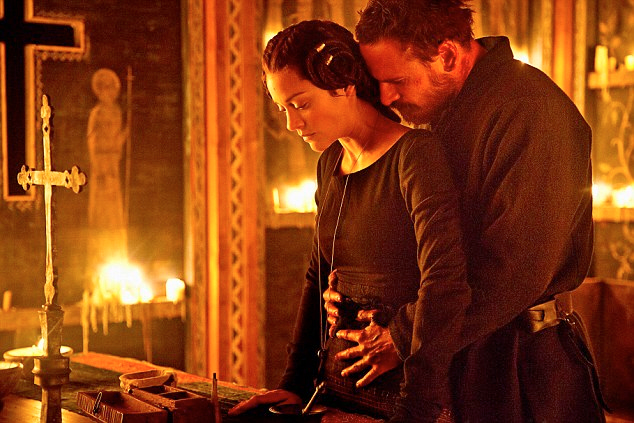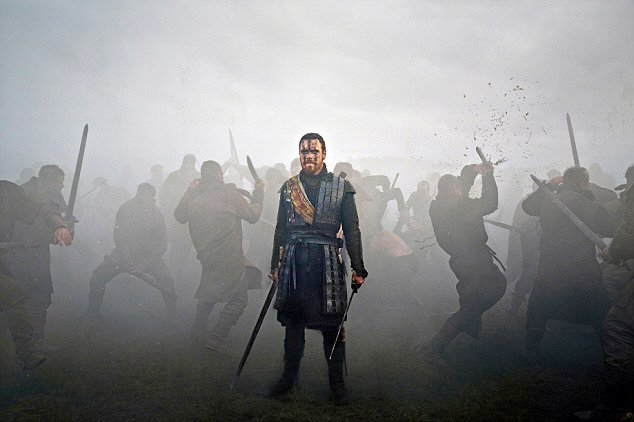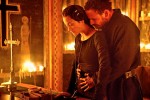During the awards season, Michael Fassbender grew out his ginger beard, which was a bold choice for an actor going through his first Oscar campaign. As it turned out, it didn’t matter because Fassy barely campaigned, and he grew his beard to play Macbeth in the latest film adaptation. Originally, the film was supposed to star Natalie Portman as Lady Macbeth, but Natalie thankfully dropped out. But then Marion Cotillard stepped into the role and I’m not really sure if that was better.
Anyway, they released the first two production stills and Michael did an interview with the Daily Mail about Macbeth. First, the stills: I like the one of Michael and Marion. Honestly. I think it’s got an interesting look and it makes me want to see the film. Reading this interview makes me want to see the film too – Michael manages to talk respectfully and authoritatively about Shakespeare’s Scottish play without it becoming twee and Hiddleston-esque.
Michael Fassbender and Marion Cotillard stand respectfully still as the Thane of Cawdor is anointed king. Three times the assembled bishops, priests noblemen and soldiers cry out: ‘Hail, Macbeth!’ Fassbender refers to his screen wife as ‘Lady M’, and together, they make as powerful a screen couple as I’ve observed in many years. As I sit with director Justin Kurzel and watch the scene he’s shooting at Ely Cathedral (standing in for Dunsinane Castle), the camera picks out Fassbender’s eyes, and they give a hint of Macbeth’s inner torment.
‘He’s suffering from post-traumatic stress disorder,’ Fassbender told me later. ‘It makes total sense, when you think about it. Justin set the seed of the idea in my head. This trauma is something we know about. In World War I they called it battle fatigue, and it was probably more horrific in Macbeth’s days, when they were killing with their bare hands, and driving a blade through bodies. He’s having these hallucinations, and he needs to return to the violence to find some sort of clarity, or peace.’
Macbeth and his Lady M had also, the actor and director point out, lost a child.
‘He’d been away fighting and when he returns, we see it’s a relationship that’s broken down. They lost a child, and there wasn’t time for them to grieve because he’s been away campaigning.’ However, the couple do reconnect. ‘Lady M is desperate for that reconnection, and briefly they do. And, of course, the doorway has been opened to darkness and to violence,’ Fassbender said.
After Duncan is murdered, Lady M hopes that this ‘fantastical deed, this terrible deed, this extraordinary deed of killing a king will be something that will bond them together’.
But once the blood is spilled, it leads to more and more killings. ‘He’s wary of doing it,’ Fassbender said, ‘but Lady M bolsters him, and tells him to garner his strength.’
The Bard’s verse remains, too, though it has been edited. ‘There’s a vibrancy and intelligence to the script,’ Fassbender observed. He explained that the cast speak with Scottish accents — all apart from Lady M, the Oscar-winning French actress Ms Cotillard. ‘We felt it would be unreasonable for her to put on a Scottish accent. It would not be unreasonable to presume that her character spent time in the French court.’
I asked how he was approaching the psychology of Macbeth. How evil was he? ‘I always have a problem with that word,’ Fassbender said sharply. ‘It never gives me any information, or helps me in any way. I like to find a character’s motivation. I don’t think Macbeth is evil. I think he’s damaged. When we meet him, he’s a man who’s as good as his circumstances will allow. He serves his king loyally and looks after his soldiers.’
And what about Edwin Epps, his character in 12 Years? Surely he was evil? ‘You put it down to insecurity, and fears — unless of course you’re dealing with a total sociopath. Evil is a cloudy word, and something that’s not going to inform me to play the character in any other way than pantomime.’
The Mail’s Baz Bamigboye also reports that Michael consulted his friend James McAvoy about playing Macbeth, because McAvoy had done Macbeth on stage in the West End last year (and McAvoy had a ginger beard too). Apparently, McAvoy gave Fassy some Macbeth literature and help.
As for Michael’s interpretation of “Lady M” and Macbeth’s motivations… it’s interesting. I mean, obviously, Lady Macbeth is one of the most fascinating female characters in the history of the English language, and I think it’s an interesting take on the play to basically boil it all down to “they’re trying to reconnect and strengthen their marriage through murdering a bunch of people.” And the post-traumatic stress thing is good too. Hopefully there won’t be too much “war” stuff in the movie though.
Photos courtesy of ‘Macbeth’/Daily Mail and WENN.



















Okay, that’s a bit hot. While I don’t necessarily agree with the PTST aspect, he sounds like he’s thinking it through carefully. I like their take on the relationship – it’s going to be hard to best the Goold/Stewart Macbeth, though.
And I don’t generally agree with much of this article – except that Lady M is one of the most interesting characters in the English language.
Yeah, I don’t think their marriage is ever in trouble. In fact, I always think that the Macbeths are one of the most stable couples in Shakespeare.
“And I don’t generally agree with much of this article – except that Lady M is one of the most interesting characters in the English language. ”
Chaucer’s Wife of Bath was far more interesting than Lady MacBeth.
I do enjoy some analysis of Shakespeare, but Macbeth is a tragic hero, ergo he has a tragic flaw. It seems unlikely to be PTSD/battle fatigue. I just struggle to see the value of attempting to explain or absolve Macbeth by saying he had PTSD. I like the idea that he seeks clarity in violence, that’s interesting but to just stick a modern (ish) label of a serious, psychological condition on him and call it job done – that seems like not looking at the other sources around the play, considering the history of the time period portrayed or considering when Shakespeare was writing AND who for.
I think that Fassy was not so much commenting on the interpretation of the script and original play as he was in how they found their motivation to carry out said script. Twice he sort of gently corrects the interviewer when he or she tries to paint Macbeth as simply “evil”. That does no justice to the complexity and nuance inherent in Shakespeare’s writing. I’m interested to see how this turns out. I will admit to being a bit weirded out by the casting of Marion Cotilliard though. Not because she isn’t a worthy actress, but the whole Scottish Play thing is just so ingrained in our collective psyches, I fear she may have to work twice as hard to win us over. We shall see. I could be biased, being up here in the Highlands and all.
@Highland F.
Well if you’re up in the Highlands and all, you should know that Shakespeare’s Macbeth is loosely based on history and many facts/people in the play are different from what happened in reality… So given that it is fiction, we might see Cotillard as a good choice once the film is out 🙂
And the Scottish accent thing is just Shakespeare’s take…. Scots didn’t speak English with a Scottish accent in the 11th century.
So Lady M will have a French accent? Is this because Marion couldn’t do a Scottish one?
Also, I’m not well versed in the court system of that period but would a noble Scottish family have sent their daughter to the French court? I could see an English family doing that because of the relationships between the English and French courts, but did the Scottish ( who I’m assuming weren’t under English rule during the time of MacBeth) have those kinds of connections with Continental Europe? Or are they saying that she was originally a French noble woman that married into a Scottish family?
Maybe I’m thinking too deeply about this, but if anyone has answers I loved to hear them?
I think Scotland and France had a common need to curtail the power of England, although I don’t know of any formal alliance between France and Scotland before 1292, and I think Macbeth is around 1050? I am doing that from memory and could be wrong.
Scotland acted independently of England until mid-17th century and conquest by Cromwell, but there was a great deal of interaction between England, Scotland, and France after William of Normandy invasion in 1066, along with Anglo-French influences among the feudal nobility of Scotland. It’s an interesting take on the play to bring this interaction to light.
The film looks good–even the beard looks better in this than it did at the Oscar season (which I’m glad he skipped, since we now have this film.)
His interpretation is interesting. I just watched Fiennes’ excellent Coriolanus, and I love it when actors/directors rethink what the play is about.
I don’t think it’s particularly far-fetched that Lady M would have a french accent – Scotland and France had an alliance, it is generally dated from about the 13th century to the union, but some historians say it was from the 11 century. It’s referred to as the Auld Alliance in Scotland.
ETA – I see some much quicker people than I have already answered this 🙂
I thought it a bit of a stretch too, but there is the Auld Alliance between France and Scotland, so perhaps if they are taking that angle…well. I’ll see it regardless.
Yes. That’s how Mary Queen of Scots (mother of James IV/I) was educated. Anne Boleyn, too. It was very common, although the French court had a terrible reputation for corrupting women.
It won’t let me edit: I meant James VI.
I knew about Queen Mary and how noble families from England would send their daughters to the French courts. I just figured MacBeth was set in a time way before Scotland and France had any political connection.
Shakespeare conflates past and present. I just assume the film is doing the same, although I do agree that it resists the pseudo-medieval setting. That said, French was the national language of England for a long time until about the fourteenth century.
Wasn’t Marie De Guise from a french noble house anyways and raised in France?So her situation was a bit different from Anne Boleyn’s. Also French was the language of court, considered more refined and elegant than the other European languages for some time.
@GoodNamesAllTaken and @Lucretia: Thanks for the info. I only know a bit about European politics from that time period and mainly only between England and the powers of the Continent. Never really read up on Scotland.
I’m Scottish, so obviously I’m going to urge you to have a wee look at Scottish history – lots of it is really interesting and the union stuff is really relevant just now. A do, however, offer this brief disclaimer – a lot of Scottish history does seem to revolve around sheep.
@Janey: LOL at the sheep. Do you have any books suggestions to get a good picture of Scottish history? Documentaries?
The most I know about Scottish history are the bits I learned while reading part of the Outlander series and after looking up the history of the song The Bonnie Banks o’ Loch Lomond. Don’t really know much of the history before that time period or after.
Oooh, I had a really good overview book the first year of my degree and I cannot for the life of me remember what it was called. I will check my amazon thing and get back to you (though I am sure others will recommend stuff, as well) However, rather than forking out for a book – have you ever tried those online lectures? The book I had was The Scottish Nation 1700-2007 by T M Devine.
@Janey: Thanks for the book suggestions and I was poking around youtube and think I found a decent looking documentary on Scottish history. It’s called “A History of Scotland” . Here’s the link for anyone else that may also be interested in it: https://www.youtube.com/watch?v=MkTcJo4UHMw
@Janey
Scotland, a New History by Michael Lynch was my ‘bible’ in my first year at university.
I usually tried to stay awake whilst reading T. Devine’s books lol
@jinni: The Bruce trilogy by Nigel Tranter. Historical fiction, but wonderfully written and an excellent window into the Scotland of William Wallace and Robert the Bruce
The actual historic Macbeth and his wife wouldn’t have necessary have had what we consider a scottish accent anyways. They would have spoken “Middle Irish” as their first language.
Macbeth = Mac Bethad mac Findlaích
“Mac Bethad” is actually a personal name and not a patronymic (which mac would normally imply). In this case the name literally means “Son of Life”. His father’s name (Findlaích) literally means “Blonde/White warrior” as a contrast.
Hmm I guess you have a point, but still a modern Scottish accent makes more sense than using a French accent. But like others have pointed out she very well could have been raised in France and had a French accent. I just hope Marion does a good job because in the movies I’ve seen her in she hasn’t done a good job, imho.
She wouldn’t even needed to have spent time in the French court – the Norman Invasion was populated by French speakers, and the English court actually spoke French for generations afterward. She could have easily just spent time in England amongst noble society.
Nope, the auld alliance started in the 13th century and the real Macbeth lived in the 11th century.
The real lady Macbeth would have been Scottish.
What I don’t understand is why people make a fuss of a play that is only loosely based on history.
Take it as fiction and Cotillard fits in it 😉
I think sometimes people forget that there really was a King Macbeth of Scotland and he isn’t just a fictional character.
Actually, he is found in Shakespeare’s source, Holinshed’s Chronicles:
http://www.folger.edu/eduPrimSrcDtl.cfm?psid=139
Yeah but Shakespeare altered many historical details anyway (Duncan was not an old man….) so it is not possible to find an historical truth in it…..
I didn’t say the story was truthful.
I just said that Macbeth wasn’t a fictional character.
I thought his comments about evil were interesting. I think it’s rare, but I do think some people are just evil, just born that way. But I can see how that doesn’t help him create a character for a role. I doubt evil people see themselves as evil, and their thought process and justifications or motives for what they do are what make them more interesting and complete characters for him to play.
Nothing is absolute evil or absolute good. Everyone is gray. ^^ My personal take.
I think that is true almost all of the time. Almost.
Agreed. I like how Solzhenitsyn put it in Gulag Archipelago:
“Gradually it was disclosed to me that the line separating good and evil passes not through states, nor between classes, nor between political parties either — but right through every human heart — and through all human hearts. This line shifts. Inside us, it oscillates with the years. And even within hearts overwhelmed by evil, one small bridgehead of good is retained. And even in the best of all hearts, there remains … an unuprooted small corner of evil.”
I’m willing to believe that a very few people are evil as well, but yeah, that doesn’t make for a very nuanced performance. I noticed that Fassbender tried to find some humanizing qualities even in Epps, so I think it might be part of his process to try to find something about even vile characters that he can relate to.
Natalie Portman dropped out? The movie has the vaguest chance of being watchable, after all! Marion will be fine…anyway, if they had cast a.piece of furniture, it would still have been more bearable than Portman.
^^^^ for Laowai +1000
Shakespeare bores me to tears(tedious dialogue) but this does intrigue me
I’m very interested in this and will definitely watch it when it comes out!
Does anyone know why Portman dropped out by the way? I am glad she did though. I liked how psychotic and repressed she was in Black Swan (although I have my reservations about that film as a whole), but otherwise I cannot connect with her at all =/
I think Portman got a chance to direct a passion project she had been wanting to do, and it came together at the same time as Macbeth would have been filming.
I wonder if Fassbender’s dropping out of Jane Got a Gun has anything to do with it. That led to Natalie’s production turning into a mess. Maybe there’s some bad blood?
Actually, I don’t think so. She signed up for this some months after JGAG, and had nice things to say about him in a recent interview–can’t remember which one.
Thanks, ladies! I guess we’ll never know for sure but good to know your opinions 🙂
Macbeth is my favorite hero/tragedy. I wrote a 24 page paper on it in order to graduate. I wish I’d thought of PTSD as a possible cause for his visions, it does seem possible. I know it’s a modern diagnosis, but people are people and it seems apt. I don’t agree with the idea that their marriage was breaking down at the beginning of the play, if anything the way she greeted him shows how proud and supportive she was. As we know the breakdown of the marriage comes later when Lady M cannot rid herself of the guilt. I also don’t agree that she could have been in the French court. I don’t see that happening when MacBeth takes place prior to the battle of Hastings. It seems like a band aid because Cotillard could not get rid if her accent. That said, the PTSD turn is a new way of looking at the motivation of the character and I think Fassbender, as always, proves to be a thoughtful actor, intent on fleshing out his characters and understanding them at the base level. I can’t wait to see this. I hope Cotillard is as good as Fassbender. A lot rides on their chemistry.
Yeah, I think saying Lady M had been at the French court is stretching it a bit, and is an obvious excuse for Cotiliard’s accent. Oh well.
I’m a bit sceptical about the PTSD thing. Like I said below, I think they are trying to make Macbeth seem ‘modern’ and ‘relatable’ – and possibly anachronistic into the bargain. Macbeth was a brave, seasoned warrior who lived by the sword. He wasn’t some 19 year old grunt taken out of college and thrown onto the front line with a gun shoved into his hand. Killing was essentially Macbeth’s job, and there’s no reason at all to suppose he’s in any way traumatised by killing his enemies on the battleground. I think that line of thinking is a tad anachronistic.
When I studied Macbeth, lady macbeth is one of my favourite female characters she always struck me with someone who suffers with bi polar disorder and deffiently not the psycopath some people think she is for one psycopaths don’t feel guilt but she does. Also I think it would make sense that Macbeth would of PTSD even seasoned warriors can suffer from it.
Lmao@”thankfully, Natalie dropped out” . My thought exactly. I do not feel in any way battle she has the chops for Shakespeare, regardless of her being an Oscar winning actress.
It’s posts like this that give me life. Fassbender, Scottish history, Shakespeare, and good v. evil all in one post!
I like the idea of PTSD as a mitigating factor in his behavior. MacBeth has been done so many times that it intrigues me when someone brings up a different concept. My nephew’s in his college production of MacBeth, so I’ll tell him to go read if he hasn’t already.
It’s an interesting theory that MacBeth was suffering from PTSD. I would assume that people in ancient times would be desensitized by the trauma of war because of how death was so prevalent in those times. But maybe that’s a wrong assumption to make. Can’t wait to see how the film tackles that idea.
This is slightly different, but I’ve read a psychological study that indicated that mothers who have lost young children have similar lengths of grieving and rates of depression, regardless of whether the woman lives in a culture with a high infant mortality rate where the death of a child is something that happens to many parents or in an industrialized nation where it’s a very uncommon experience. I wonder if PTSD might be similar. I think it’s at least possible that people weren’t all that desensitized and that certain portions of the past really did contain a lot of human suffering.
I do think that people had a different take on traumatic circumstances back then. I wouldn’t say that they were necessarily desensitized, but I think that warriors especially had a different way of dealing with death (like compartmentalizing etc.). And the cultural view on war and killing was VERY different which imho makes a big difference. If you live in a culture where killing is one of the worst things you can do then it has another impact on yourself than if you live in a culture where being a war hero is the best thing you can do. In ancient Norse mythology their idea of a “heaven” was Valhalla – an afterworld where warriors were able to fight in battles all day and were magically healed by night when they had some nice boozy sessions. For us modern people today this is quite … strange. Why would you like to continue in this horrible thing of blood and death when you are in heaven? But.. oh well..
And speaking of boozy sessions – I guess “self-medication” was common and socially accepted. In medieval times water wasn’t really considered a beverage but instead people drank wine and beer all day (also the children). Even considering that the alcohol content of both was slightly lower back then it’s kind of … crazy.
I agree with @shoeman and @Isadora. Judging by books and documentaries on European Middle/Early Middle Ages i also came to the conclusion that death and killings were basically part of everyday life, and (un)fortunately did not traumatise people as much as after the Industrial Revolution and up to today. As Isadora points further down, PTSD might be oversimplifying things, or rather trying too hard to make the character’s psychology more digestible to modern mind. Which can be both constructive and destructive to the character and the story. I love Fassbender (I have just watched all 3 McQueen films with him and damn he has a fine screen presence!) so i am very much looking forward to this Macbeeth and crossing fingers for Kurzel, Fassbender and Cotillard to get it ALL right and plausible in the end.
LOL the best interpretation I’ve seen of Macbeth has been the Gargoyles cartoon. The character take on Macbeth was great. Instead of being a ambitious conniving king, he really thought he was the best person for the time.
I loved Gargoyles that use to be my show.
It’s not necessarily the case that Macbeth and his lady lost a child together, let alone that it happened just before Macbeth went off to the wars. Fassbender seems to be reaching a bit.
We do know that Lady Macbeth had ‘given suck’ so must have had at least one child, and we also know that she and Macbeth have no (surviving) children together. So it’s possible that their child(ren) did die, or it’s also possible that Lady M had children from a previous marriage. We just don’t know. Fassbender seems to be trying to ‘contemporise’ Macbeth and his lady’s relationship by portraying them almost as a modern couple trying to mend their marriage after the loss of a child. Of course, Fassbender is free to interpret the text any way he wants, I’m just pointing out that the play itself is ambiguous regarding whether or not Macbeth hand his lady had children together, and it’s not given much attention anyway.
And while I’m relieved that Portman dropped out – the average check-out girl at my local supermarket could do a better job as Lady Macbeth – I’m not crazy about the choice of Cotiliard, Was Tilda Swinton not available? Or Cate Blanchett? Or even Lena Headey? Then again, maybe Cotiliard will prove my skepticism wrong.
I agree that it hasn’t been established that Lady M and MacBeth ever had a child together. After his own children were murdered, MacDuff says of Macbeth that ‘he has no children’. Claiming they were suffering the loss of a child is over reaching.
Also, I think Lena Headley’s GOT character is LadyMacbeth. It is hard to not draw comparisons..
I don’t like the PTSD explanation. It seems, well, silly. I do like Fassbender as Macbeth, though. I saw a production by the RSC about 20 years ago, and they played it extremely sexy. I think Fassy will do Macbeth justice.
I think Fass is going to be the one with PTSD after he’s done with Naomi.
Hahahahaha, Nymeria, epic 😀
“Lady Macbeth is one of the most fascinating female characters in the history of the English language”
Well that’s just sad, as she is a pretty basic one-dimensional character. If she were a man no one would remember her twice. People seem to think she’s an amazing character just because she’s a woman acting like a man – but a simplistic “bad guy” man, not a realistic multi-layered person like all the other Shakespeare characters who are awesome, and who are of course men.
The most fascinating character in that play is Macbeth. No one else comes close, not to me anyway.
And are we praising hottie Fassy for using his brain now and again? LOL, well winning the ladies over has really become easy, hasn’t it.
Well, I guess I’m spoiled concerning brains. Because Fassy IS hot, but no… I don’t like his explanations at all, I have to say. I hope he does a tremendous job because he is a good actor and I’ve seen great performances from actors that where, let’s say, underwhelming in their interviews regarding their characters, so I will wait and see. An actor has to have a personal take on a character and it doesn’t necessarily have to be mine to make a good result.
BUT.. really, the PTSD thing is a bit simple and not very convincing for me (as some have pointed out: he IS a seasoned warrior living in a warrior culture). And if he modernises him in this way it takes so much from the character and the play for me. The same can be said for the marriage issues, lost child and all.. it’s a bit of a reach. Plus it kind of changes the game a bit – a couple killing people to bond over it (sound like Natural Born Killers lol) is quite different than a couple and especially a noble Lady consumed with ambition and willing to do anything and everything to ensure that they reach the top of the food chain – even though they have no offspring to pass it on to. That’s what I think is so interesting about the Macbeth couple (esp. Lady Macbeth) – they are willing to do this without a chance of founding a dynasty, they do it just for their own glory. And maybe that’s the reason they break in the aftermath.
So… yeah. Fassy’s hot, but I begin to think I like him better as the drinking, womanizing, motorcycle bloke than the Shakespeare guy.
You know…I’m beginning to look forward to seeing this.